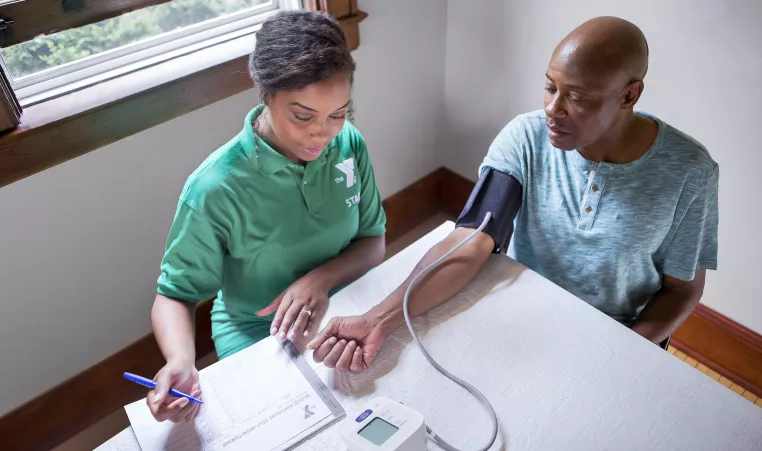
Did you know that February is American Heart month?
Heart disease continues to be the leading cause of death among both men and women in America. Annually, about 610,000 people die of heart disease in the U.S., accounting for about 1-in-4 deaths. The good news is that making lifestyle changes and seeking proper medical care can reduce heart disease risk.
One of the most important lifestyle changes to reduce heart disease risk is to eat a heart-healthy diet. Heart-healthy eating for instance can help you prevent and/or manage heart disease risk factors as high blood pressure and high cholesterol.
Tips to Eat Heart Healthy:
- Eat fruits and vegetables. Eat a variety of fruit and vegetable servings every day. Dark green, deep orange, and yellow fruits and vegetables are especially nutritious. Examples include spinach, carrots, peaches, and berries.
- Eat a variety of grain products every day. Include whole-grain foods that have lots of fiber and nutrients. Examples of whole grains include oats, whole wheat bread, and brown rice.
- Eat fish at least 2 times each week. Oily fish, which contain omega-3 fatty acids, are best for your heart. These fish include salmon, mackerel, lake trout, herring, and sardines.
- Limited saturated fat and cholesterol. To limit saturated fat and cholesterol, try to choose the following foods:
- Lean meats and meat alternatives like beans or tofu
- Fish, vegetables, beans, and nuts
- Non-fat and low-fat dairy products
- Polyunsaturated or monosaturated fats, like canola and olive oils, to replace saturated fats
- Read food labels and limit the amount of trans fat you eat. Trans fat raises the levels of LDL ("bad") cholesterol and lowers high-density lipoprotein (HDL, or "good") cholesterol in the blood. Trans fat is found in many processed foods made with shortening or with partially hydrogenated or hydrogenated vegetable oils. These foods include cookies, crackers, chips, and many snack foods.
- Choose healthy fats. Unsaturated fats, such as olive, canola, corn, and sunflower oils, are part of a healthy diet. But all fats are high in calories, so watch your serving sizes.
- Limit salt (sodium). For good health, less is best. This is especially important for people who are at risk for or already have high blood pressure. Try to limit how much sodium you eat to less than 2,300 milligrams (mg) a day. This can help lower your blood pressure. If you have high blood pressure and limit your sodium to 1,500 mg a day, you can lower your blood pressure even more. Choose and prepare foods with little or no salt. Watch for hidden sodium in foods.
- Eat only as many calories as you need to stay at a healthy weight. Learn how much is a serving, and then check your portion sizes. Limit drinks with added sugar. If you want to lose weight, increase your activity level to burn more calories than you eat.
- If you drink alcohol, drink in moderation. Limit alcohol intake to 2 drinks a day for men and 1 drink a day for women.
- Limit added sugar. Limit drinks and foods with added sugar
When you are eating away from home, try to follow these heart-healthy diet tips. You can get even more benefit from making diet changes if you also get plenty of exercise and don't smoke.
At first, eating heart healthy may seem overwhelming. Starting with small changes can be beneficial. Over time, making several small changes can add up to a big difference in your heart health. If you made New Year's resolutions back in January, striving to eat heart healthy may help you achieve some of these resolutions.
A registered dietitian is your best source of reliable and up-to-date food and nutrition information. A dietitian can help you identify measurable and achievable goals, as well as develop a plan to achieve them with support along the way.
For more information on how to stick to a heart-healthy eating plan, sing up to meet with the dietitian a the Hal Welsh East Area Family YMCA, Traci McIntosh, MA, RD. Traci will be available to answer questions for our members in the lobby on Wednesday, February 5th from 9-10:30am and Friday, February 28th from 5-6:30pm. In addition, a Healthy Heart Ambassador is available every Tuesday from 12:30-2:30pm to take your blood pressure and answer questions related to our self-monitoring blood pressure program.
For more information on either of these programs, contact Mary Beth Anderson, Health & Wellness Director at 315-637-2025, ext. 220 or manderson@ymcacny.org.
Have a healthy day!!